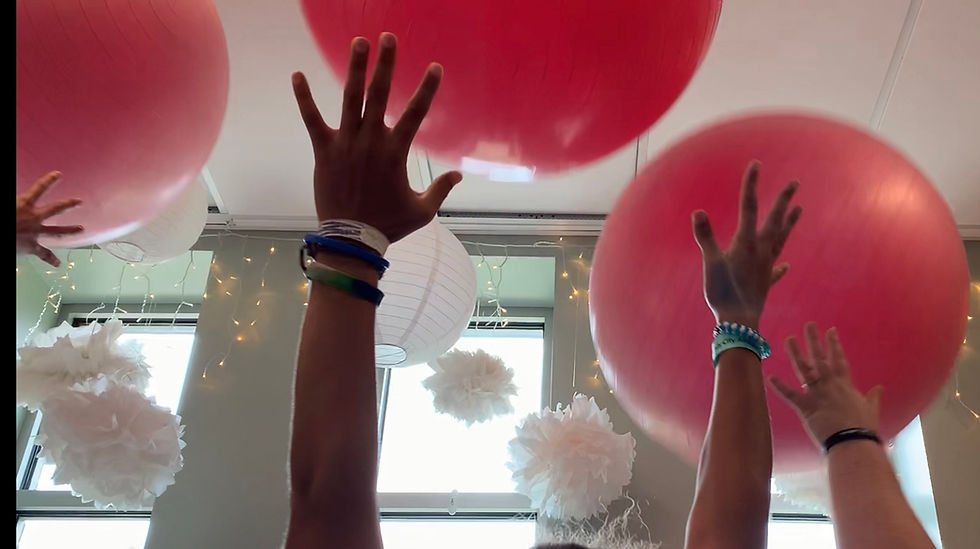Play! It's For Older Kids, Too!
- mbickhaus
- Sep 3, 2019
- 3 min read
I believe in you, teachers. I believe in our students. I know you work hard and want the best of everything for your students. That’s why I’m going to take this opportunity to write about something that seems insignificant but is actually quite powerful and has considerable implications for the social and emotional well-being of our students.

I teach high school English so it may surprise you that I make sure my students play almost every day. Usually it’s only for 3 or 4 minutes but I want them to laugh, let down, and activate as many of those feel-good chemicals in their bodies as possible.
What I’ve noticed is that not all of my students are into it. Some hang back and some refuse, some begin with hesitation and before long are fully engaged, and others jump in immediately and give themselves wholly to the play activity. It’s as if some of them don’t know HOW to play.
The other day I took all of my classes outside to play my favorite tennis-ball-group-juggle game. Along the way to our shady spot we walked by a pretty little grassy hillside. During the first period my students complied dutifully and played the game. They laughed and cooperated. It was generally a good time. We returned to the classroom for the rest of the lesson and all was well.
Third period came along and the students were a bit more buoyant. They bounced along with a little more energy and one student said, “I want to roll down that hill.” I thought that sounded like fun but since I wanted him to participate in the game I had planned I made a deal that if he engaged well in my planned activity I would allow a few extra minutes so that he could roll down the hill. It was delightful! The students were enthusiastic about the tennis ball game and we laughed even harder when so many of the kids rolled down the hill. It was hilarious. These “big boys” surprised me with their willingness to really let go and indulge in a seemingly childish activity.
But isn’t that when we feel our best? Doesn’t engaging in some “childish” antics make us sparkle just a little more? Don’t we feel lighter in both step and burden?
Play has a more important function in the world than just making us feel better. Play is the venue for the development of social and emotional skills. It’s where we figure out how to get along with others. It’s where we work out how people respond to our behaviors, how to ameliorate our behaviors when we don’t get the response we want, and how to gain control over our lives.
Dr. Peter Gray, a researcher who studies play from a biological evolutionary perspective, explains in his Ted Talk that when mammals are deprived of the opportunity to play they are crippled emotionally. When they are placed in a new environment or with an unfamiliar peer they alternately freeze in fear and lash out with inappropriate aggression; they don’t learn to respond to the social signals of the other animals. Doesn’t this sound just like the behaviors we see in some of our classrooms?
Over the last 50-60 years there’s been a decline in the opportunities provided for children to play in an unstructured and self-directed fashion. They aren’t playing outdoors at home and they aren’t playing at school. And society is paying a price for this.
While this decline in play has been occurring, we’ve also seen a well-documented increase in mental disorders in children. Gray goes on to explain that 5-8 times as many children today suffer from major depression or a clinically significant anxiety disorder as did kids in the 1950s. During this time the suicide rate for 15-24-year olds has doubled and the suicide rate for 15 and younger has quadrupled. WHAT?
So there’s a correlation. Play and Social Emotional Learning; they’re linked. Dr. Gray believes there is a cause and effect relationship. The correlation is strong. Everything we know about play based on studies tells us that these social emotional declines are what we would expect if we take play away.

If you haven’t already seen Gray’s Ted Talk above, take the time to watch it. It’s full of information that will change the way you view your students and their needs. While we can’t do much, immediately and individually, to change the big things he is suggesting, we can add play to our classrooms and spend even more time engaging the students in play…and we can do so without guilt.
When we let the kids play we are providing significant opportunities for growth and learning. Don’t let your students down! Play. Insist they play. Play with them!
“The harder it gets, the harder you have to play.” - Dr. John Cohn





Comments